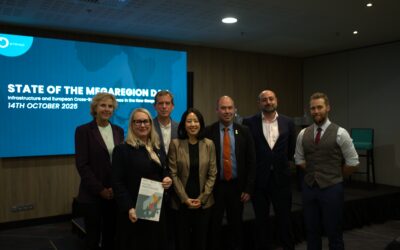A new report shows that unresolved rail bottlenecks in the STRING Corridor threaten to undermine the benefits of the Fehmarn Belt Fixed Link – with sharply rising truck traffic as a likely consequence if action is not taken now.
A new follow-up report confirms that critical rail bottlenecks in the STRING Corridor have not been resolved and that rail freight is under severe pressure ahead of the opening of the Fehmarn Belt Fixed Link.
Together with Greater Copenhagen, we have launched the report “Rail Freight with the Fehmarn Belt Fixed Link – Unlocking the Potential”, prepared by the consultancy SWECO. The report concludes that since 2023, insufficient progress has been made to remove key rail bottlenecks, significantly undermining the expected benefits of the Fehmarn Belt Fixed Link
Risk of increased road traffic
The findings are clear and concerning. Without immediate action, the opening of the Fehmarn Belt Fixed Link may result in up to 120% more trucks on European roads, as rail freight lacks the capacity, reliability and competitiveness required to absorb growing transport demand. Persistent bottlenecks mean that potential time savings for rail disappear, allowing road transport to continue gaining market share.
The report identifies 15 critical bottlenecks across Germany, Denmark, Sweden and Norway, most of which are expected to remain unresolved well beyond the planned opening of the fixed link. These constraints threaten not only climate targets, but also economic competitiveness and the resilience of the European transport system.
A matter of urgency for Europe
Thomas Becker, CEO of STRING, summarises the severity of the situation:
“The report speaks a clear language. SWECO shows we are facing an absolutely acute task – something that the current security situation and the need for military mobility in Europe clearly underscore. If the infrastructure on both sides of the Fehmarn Belt tunnel does not keep pace, we risk that bottlenecks and lack of capacity will stall this development and undermine the benefits the link can otherwise deliver.”
The report underlines that the window of opportunity is limited. If rail infrastructure is not strengthened in time, new logistics patterns will be locked in around road transport for decades to come, weakening Europe’s green transition and long-term transport efficiency.
Clear recommendations – action needed nowThe report is not only a warning, but also a concrete catalogue of solutions. It provides targeted, actionable recommendations to accelerate planning, strengthen cross-border coordination, enable longer freight trains, and ensure sufficient terminal capacity across the corridor.
STRING and Greater Copenhagen call on national governments, EU institutions and infrastructure authorities to act now. Delaying further will increase costs, emissions and congestion – and jeopardise the full socio-economic and climate benefits of the Fehmarn Belt Fixed Link




